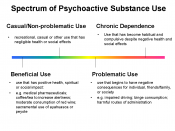Studying the interpersonal behaviors of substance abusers is an extremely difficult subject to analyze because of the difficulties in gathering data. Most of the data is formulated by abusers who attempt rehabilitation, so it may not be representational of the entire community of abusers. Thus, most of the interpersonal data gathered by substance abusers involves their behavior changes during the treatment process.
One of the most effective strategies in the treatment process of substance abusers is the therapeutic community, otherwise known as TC (Nielsen & Scarpitti, 1997). This type of treatment program is favored over other types because of the overall success rate. They view drug abuse as a disorder of the whole person, where the problem is the person, not the drug. The main goal of the recovery process is to change negative behavioral patterns. Using individual and group counseling are common vehicles used to bring about change. Many abusers who enter this program lack the skills needed to lead a drug-free lifestyle, and drug use is a social response.
The most important aspect of change is the community of peers who tackle the abuser's old values and behaviors. These peers provide support from abusive behaviors and serve as role models for lifestyle changes.
Confrontation results in the awareness of one's actions, leading the abusers to makes substantial behavior changes (Nielsen & Scarpitti, 1997). Trust is an important key factor in rehabilitation because it smoothes the process of sharing or talking about issues and problems, as well as comprehension and acceptance. It also leads to self-disclosure in groups. The changing process of TC that uses individual counseling, group therapy, confrontation to fully develop trust and recognizing changes in oneself is by far the most effective method for aiding substance abusers in long-term lifestyle change.
In the Youth Evaluation Study...


